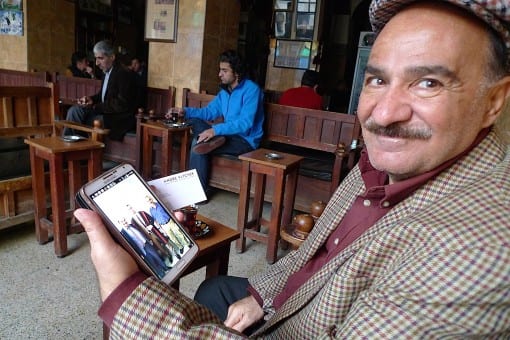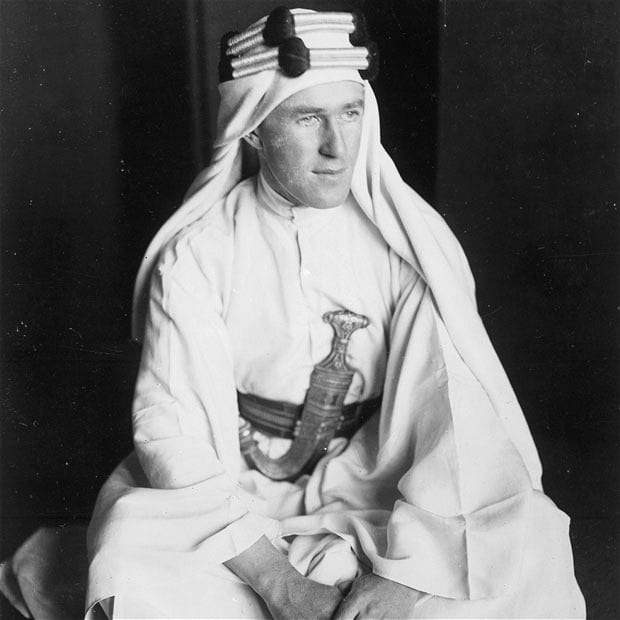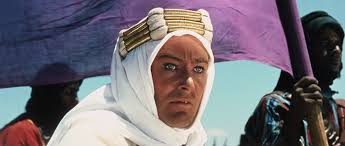Blum’s Anti Empire Report: “Yatsenuk’s Delusions”; Cuba’s calvary, and other topics.
The Anti-Empire Report #136

Bill Blum (Via M. Bradley, fickr) [Click on images to expand.]
Murdering journalists … them and us
[dropcap]After Paris,[/dropcap] condemnation of religious fanaticism is at its height. I’d guess that even many progressives fantasize about wringing the necks of jihadists, bashing into their heads some thoughts about the intellect, about satire, humor, freedom of speech. We’re talking here, after all, about young men raised in France, not Saudi Arabia.
Where has all this Islamic fundamentalism come from in this modern age? Most of it comes – trained, armed, financed, indoctrinated – from Afghanistan, Iraq, Libya, and Syria. During various periods from the 1970s to the present, these four countries had been the most secular, modern, educated, welfare states in the Middle East region. And what had happened to these secular, modern, educated, welfare states?
In the 1980s, the United States overthrew the Afghan government that was progressive, with full rights for women, believe it or not, leading to the creation of the Taliban and their taking power.
In the 2000s, the United States overthrew the Iraqi government, destroying not only the secular state, but the civilized state as well, leaving a failed state.
In 2011, the United States and its NATO military machine overthrew the secular Libyan government of Muammar Gaddafi, leaving behind a lawless state and unleashing many hundreds of jihadists and tons of weaponry across the Middle East.
And for the past few years the United States has been engaged in overthrowing the secular Syrian government of Bashar al-Assad. This, along with the US occupation of Iraq having triggered widespread Sunni-Shia warfare, led to the creation of The Islamic State (ISIL) with all its beheadings and other charming practices.
However, despite it all, the world was made safe for capitalism, imperialism, anti-communism, oil, Israel, and jihadists. God is Great!
Starting with the Cold War, and with the above interventions building upon that, we have 70 years of American foreign policy, without which – as Russian/American writer Andre Vltchek has observed – “almost all Muslim countries, including Iran, Egypt and Indonesia, would now most likely be socialist, under a group of very moderate and mostly secular leaders”. Even the ultra-oppressive Saudi Arabia – without Washington’s protection – would probably be a very different place.
On January 11, Paris was the site of a March of National Unity in honor of the magazine Charlie Hebdo, whose journalists had been assassinated by terrorists. The march was rather touching, but it was also an orgy of Western hypocrisy, with the French TV broadcasters and the assembled crowd extolling without end the NATO world’s reverence for journalists and freedom of speech; an ocean of signs declaring Je suis Charlie … Nous Sommes Tous Charlie; and flaunting giant pencils, as if pencils – not bombs, invasions, overthrows, torture, and drone attacks – have been the West’s weapons of choice in the Middle East during the past century.
Where has all this Islamic fundamentalism come from in this modern age? Most of it comes – trained, armed, financed, indoctrinated – from Afghanistan, Iraq, Libya, and Syria.
No reference was made to the fact that the American military, in the course of its wars in recent decades in the Middle East and elsewhere, had been responsible for the deliberate deaths of dozens of journalists. In Iraq, among other incidents, see Wikileaks’ 2007 video of the cold-blooded murder of two Reuters journalists; the 2003 US air-to-surface missile attack on the offices of Al Jazeera in Baghdad that left three journalists dead and four wounded; and the American firing on Baghdad’s Hotel Palestine the same year that killed two foreign cameramen.
Moreover, on October 8, 2001, the second day of the US bombing of Afghanistan, the transmitters for the Taliban government’s Radio Shari were bombed and shortly after this the US bombed some 20 regional radio sites. US Defense Secretary Donald Rumsfeld defended the targeting of these facilities, saying: “Naturally, they cannot be considered to be free media outlets. They are mouthpieces of the Taliban and those harboring terrorists.”
And in Yugoslavia, in 1999, during the infamous 78-day bombing of a country which posed no threat at all to the United States or any other country, state-owned Radio Television Serbia (RTS) was targeted because it was broadcasting things which the United States and NATO did not like (like how much horror the bombing was causing). The bombs took the lives of many of the station’s staff, and both legs of one of the survivors, which had to be amputated to free him from the wreckage.
I present here some views on Charlie Hebdo sent to me by a friend in Paris who has long had a close familiarity with the publication and its staff:
“On international politics Charlie Hebdo was neoconservative. It supported every single NATO intervention from Yugoslavia to the present. They were anti-Muslim, anti-Hamas (or any Palestinian organization), anti-Russian, anti-Cuban (with the exception of one cartoonist), anti-Hugo Chávez, anti-Iran, anti-Syria, pro-Pussy Riot, pro-Kiev … Do I need to continue?
“Strangely enough, the magazine was considered to be ‘leftist’. It’s difficult for me to criticize them now because they weren’t ‘bad people’, just a bunch of funny cartoonists, yes, but intellectual freewheelers without any particular agenda and who actually didn’t give a fuck about any form of ‘correctness’ – political, religious, or whatever; just having fun and trying to sell a ‘subversive’ magazine (with the notable exception of the former editor, Philippe Val, who is, I think, a true-blooded neocon).”
Dumb and Dumber
Remember Arseniy Yatsenuk? The Ukrainian whom US State Department officials adopted as one of their own in early 2014 and guided into the position of Prime Minister so he could lead the Ukrainian Forces of Good against Russia in the new Cold War?

“Prime Minister” Yatsenyuk holding forth before the Atlantic Council. (Atlantic Council, via flickr)
In an interview on German television on January 7, 2015 Yatsenuk allowed the following words to cross his lips: “We all remember well the Soviet invasion of Ukraine and Germany. We will not allow that, and nobody has the right to rewrite the results of World War Two”.
The Ukrainian Forces of Good, it should be kept in mind, also include several neo-Nazis in high government positions and many more partaking in the fight against Ukrainian pro-Russians in the south-east of the country. Last June, Yatsenuk referred to these pro-Russians as “sub-humans” , directly equivalent to the Nazi term “untermenschen”.
So the next time you shake your head at some stupid remark made by a member of the US government, try to find some consolation in the thought that high American officials are not necessarily the dumbest, except of course in their choice of who is worthy of being one of the empire’s partners.
The type of rally held in Paris this month to condemn an act of terror by jihadists could as well have been held for the victims of Odessa in Ukraine last May. The same neo-Nazi types referred to above took time off from parading around with their swastika-like symbols and calling for the death of Russians, Communists and Jews, and burned down a trade-union building in Odessa, killing scores of people and sending hundreds to hospital; many of the victims were beaten or shot when they tried to flee the flames and smoke; ambulances were blocked from reaching the wounded … Try and find a single American mainstream media entity that has made even a slightly serious attempt to capture the horror. You would have to go to the Russian station in Washington, DC, RT.com, search “Odessa fire” for many stories, images and videos. Also see the Wikipedia entry on the 2 May 2014 Odessa clashes.
If the American people were forced to watch, listen, and read all the stories of neo-Nazi behavior in Ukraine the past few years, I think they – yes, even the American people and their less-than-intellectual Congressional representatives – would start to wonder why their government was so closely allied with such people. The United States may even go to war with Russia on the side of such people.
L’Occident n’est pas Charlie pour Odessa. Il n’y a pas de défilé à Paris pour Odessa.
Some thoughts about this thing called ideology
Norman Finkelstein, the fiery American critic of Israel, was interviewed recently by Paul Jay on The Real News Network. Finkelstein related how he had been a Maoist in his youth and had been devastated by the exposure and downfall of the Gang of Four in 1976 in China. “It came out there was just an awful lot of corruption. The people who we thought were absolutely selfless were very self-absorbed. And it was clear. The overthrow of the Gang of Four had huge popular support.”
Many other Maoists were torn apart by the event. “Everything was overthrown overnight, the whole Maoist system, which we thought [were] new socialist men, they all believed in putting self second, fighting self. And then overnight the whole thing was reversed.”
“You know, many people think it was McCarthy that destroyed the Communist Party,” Finkelstein continued. “That’s absolutely not true. You know, when you were a communist back then, you had the inner strength to withstand McCarthyism, because it was the cause. What destroyed the Communist Party was Khrushchev’s speech,” a reference to Soviet premier Nikita Khrushchev’s 1956 exposure of the crimes of Joseph Stalin and his dictatorial rule.
Although I was old enough, and interested enough, to be influenced by the Chinese and Russian revolutions, I was not. I remained an admirer of capitalism and a good loyal anti-communist. It was the war in Vietnam that was my Gang of Four and my Nikita Khrushchev. Day after day during 1964 and early 1965 I followed the news carefully, catching up on the day’s statistics of American firepower, bombing sorties, and body counts. I was filled with patriotic pride at our massive power to shape history. Words like those of Winston Churchill, upon America’s entry into the Second World War, came easily to mind again – “England would live; Britain would live; the Commonwealth of Nations would live.” Then, one day – a day like any other day – it suddenly and inexplicably hit me. In those villages with the strange names there were people under those falling bombs, people running in total desperation from that god-awful machine-gun strafing.
This pattern took hold. The news reports would stir in me a self-righteous satisfaction that we were teaching those damn commies that they couldn’t get away with whatever it was they were trying to get away with. The very next moment I would be struck by a wave of repulsion at the horror of it all. Eventually, the repulsion won out over the patriotic pride, never to go back to where I had been; but dooming me to experience the despair of American foreign policy again and again, decade after decade.
The human brain is an amazing organ. It keeps working 24 hours a day, 7 days a week, and 52 weeks a year, from before you leave the womb, right up until the day you find nationalism. And that day can come very early. Here’s a recent headline from the Washington Post: “In the United States the brainwashing starts in kindergarten.”
Oh, my mistake. It actually said “In N. Korea the brainwashing starts in kindergarten.”
Let Cuba Live! The Devil’s List of what the United States has done to Cuba
On May 31, 1999, a lawsuit for $181 billion in wrongful death, personal injury, and economic damages was filed in a Havana court against the government of the United States. It was subsequently filed with the United Nations. Since that time its fate is somewhat of a mystery.
The lawsuit covered the 40 years since the country’s 1959 revolution and described, in considerable detail taken from personal testimony of victims, US acts of aggression against Cuba; specifying, often by name, date, and particular circumstances, each person known to have been killed or seriously wounded. In all, 3,478 people were killed and an additional 2,099 seriously injured. (These figures do not include the many indirect victims of Washington’s economic pressures and blockade, which caused difficulties in obtaining medicine and food, in addition to creating other hardships.)
The case was, in legal terms, very narrowly drawn. It was for the wrongful death of individuals, on behalf of their survivors, and for personal injuries to those who survived serious wounds, on their own behalf. No unsuccessful American attacks were deemed relevant, and consequently there was no testimony regarding the many hundreds of unsuccessful assassination attempts against Cuban President Fidel Castro and other high officials, or even of bombings in which no one was killed or injured. Damages to crops, livestock, or the Cuban economy in general were also excluded, so there was no testimony about the introduction into the island of swine fever or tobacco mold.
However, those aspects of Washington’s chemical and biological warfare waged against Cuba that involved human victims were described in detail, most significantly the creation of an epidemic of hemorrhagic dengue fever in 1981, during which some 340,000 people were infected and 116,000 hospitalized; this in a country which had never before experienced a single case of the disease. In the end, 158 people, including 101 children, died. That only 158 people died, out of some 116,000 who were hospitalized, was an eloquent testimony to the remarkable Cuban public health sector.
The complaint describes the campaign of air and naval attacks against Cuba that commenced in October 1959, when US president Dwight Eisenhower approved a program that included bombings of sugar mills, the burning of sugar fields, machine-gun attacks on Havana, even on passenger trains.
Another section of the complaint described the armed terrorist groups, los bandidos, who ravaged the island for five years, from 1960 to 1965, when the last group was located and defeated. These bands terrorized small farmers, torturing and killing those considered (often erroneously) active supporters of the Revolution; men, women, and children. Several young volunteer literacy-campaign teachers were among the victims of the bandits.
There was also of course the notorious Bay of Pigs invasion, in April 1961. Although the entire incident lasted less than 72 hours, 176 Cubans were killed and 300 more wounded, 50 of them permanently disabled.
The complaint also described the unending campaign of major acts of sabotage and terrorism that included the bombing of ships and planes as well as stores and offices. The most horrific example of sabotage was of course the 1976 bombing of a Cubana airliner off Barbados in which all 73 people on board were killed. There were as well as the murder of Cuban diplomats and officials around the world, including one such murder on the streets of New York City in 1980. This campaign continued to the 1990s, with the murders of Cuban policemen, soldiers, and sailors in 1992 and 1994, and the 1997 hotel bombing campaign, which took the life of a foreigner; the bombing campaign was aimed at discouraging tourism and led to the sending of Cuban intelligence officers to the US in an attempt to put an end to the bombings; from their ranks rose the Cuban Five.
To the above can be added the many acts of financial extortion, violence and sabotage carried out by the United States and its agents in the 16 years since the lawsuit was filed. In sum total, the deep-seated injury and trauma inflicted upon on the Cuban people can be regarded as the island’s own 9-11.
Notes
- US Department of the Army, Afghanistan, A Country Study (1986), pp.121, 128, 130, 223, 232
- Counterpunch, January 10, 2015
- Index on Censorship, the UK’s leading organization promoting freedom of expression, October 18, 2001
- The Independent (London), April 24, 1999
- “Ukrainian Prime Minister Arseniy Yatsenyuk talking to Pinar Atalay”, Tagesschau (Germany), January 7, 2015 (in Ukrainian with German voice-over)
- CNN, June 15, 2014
- See William Blum, West-Bloc Dissident: A Cold War Memoir, chapter 3
- Washington Post, January 17, 2015, page A6
- William Blum, Killing Hope: US Military and CIA Interventions Since World War II, chapter 30, for a capsule summary of Washington’s chemical and biological warfare against Havana.
- For further information, see William Schaap, Covert Action Quarterly magazine (Washington, DC), Fall/Winter 1999, pp.26-29
Any part of this report may be disseminated without permission, provided attribution to William Blum as author and a link to this website are given.
What is $1 a month to support one of the greatest publications on the Left?







